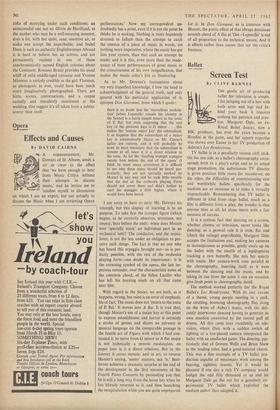Opera
Effects and Causes
By DAVID CAIRNS
A CORRESPONDENT, Mr. Downes of St. Albans, sends a cri de cceur to the effect that 'we have enough to bear from Music Critics without their attempts to discuss music,' and he invites me to 'confine myself to discussions on which I am an expert, but not actually to discuss the Music when I am reviewing Opera performances.' Now my correspondent un- doubtedly has a point, even if it is not the point he thinks he is making. Nothing is more hopelessly doomed to failure than the attempt to catch the essence of a piece of music in words, yet nothing more imperative, where the music has got into your system, than that such an attempt be made; and it is this, even more than the inade- quacy of most performances of great music or the consciousness of his own insignificance, that makes the music critic's life so frustrating.
As to Mr. Downes's insinuations about my very imperfect knowledge, I bow the head in acknowledgment of the general truth, and only quarrel with his particular application of it, apropos Don Giovanni, from which I quote : there is no doubt that the 'marvellous modula- tion' [when Leporello reveals his identity in the Sextet] is a fairly simple return to the tonic of E flat; but even supposing that the real key of the previous bars is G minor . . . this makes the 'remote major key' the submediant. It so happens that the submediant of a minor key is automatically Major so Mr. Cairns's italics are curious, and it will probably be news to most musicians that the submediatit is remote at all since it is a direct relation to the tonic. As for the 'dazzling trumpet arpeggio twenty bars before the end of the opera' (I think he must mean seventeen) it is difficult to see why these notes should be heard par- ticularly; they are not specially marked by Mozart in any way and he took little trouble that the rest of the orchestra playing Forte should not cover them and didn't bother to start his arpeggio a fifth higher, where it would have been heard.
I am sorry to have to deny Mr. Downes his triumph, but this display of learning is to no purpose. To take first the trumpet figure (which begins, as he correctly observes, seventeen, not twenty, bars before the end): when does Mozart ever 'specially mark' an individual part in an orchestral tutti? The conductor, and the music- lover, is not the less under an obligation to per- ceive such things. The fact is that no one who has heard this arpeggio brought out—as is per- fectly possible, with the rest of the orchestra playing forte—can doubt its importance: it is the crowning symbol of the opera, the last im- perious reminder, over the characteristic notes of the common chord, of the fallen Lucifer who has left his burning mark on all that came near him.
With regard to the Sextet, we are both, as it happens, wrong, but mine is an error of emphasis, his of fact. The music does not 'return to the tonic of E flat.' It moves into A flat. It is true that, though Mozart's use of a major key at this point to express astonishment and horror is certainly a stroke of genius and shows an advance in musical language on the comparable passage in the fourth act of Figaro with which I had con- trasted it, to move from G minor to A flat major is not technically a remote modulation, on paper (nor is it a direct relation). But to the listener it seems remote; and in art, to reverse Hamlet's saying, 'seems' matters, not 'is.' Beet- hoven achieves a dramatic surprise at the end of the development in the first movement of his Fourth Piano Concerto by persuading you that he is still a long way from the home key when he has already returned to it, and then launching the recapitulation while you are quite unprepared for it. In Don Giovanni, as is common with Mozart, the poetic effect of that abrupt dominant seventh chord of A flat at `Dei—Leporello' is out of all proportion to the technical means. And if is effects rather than causes that are the critic's business.














































 Previous page
Previous page